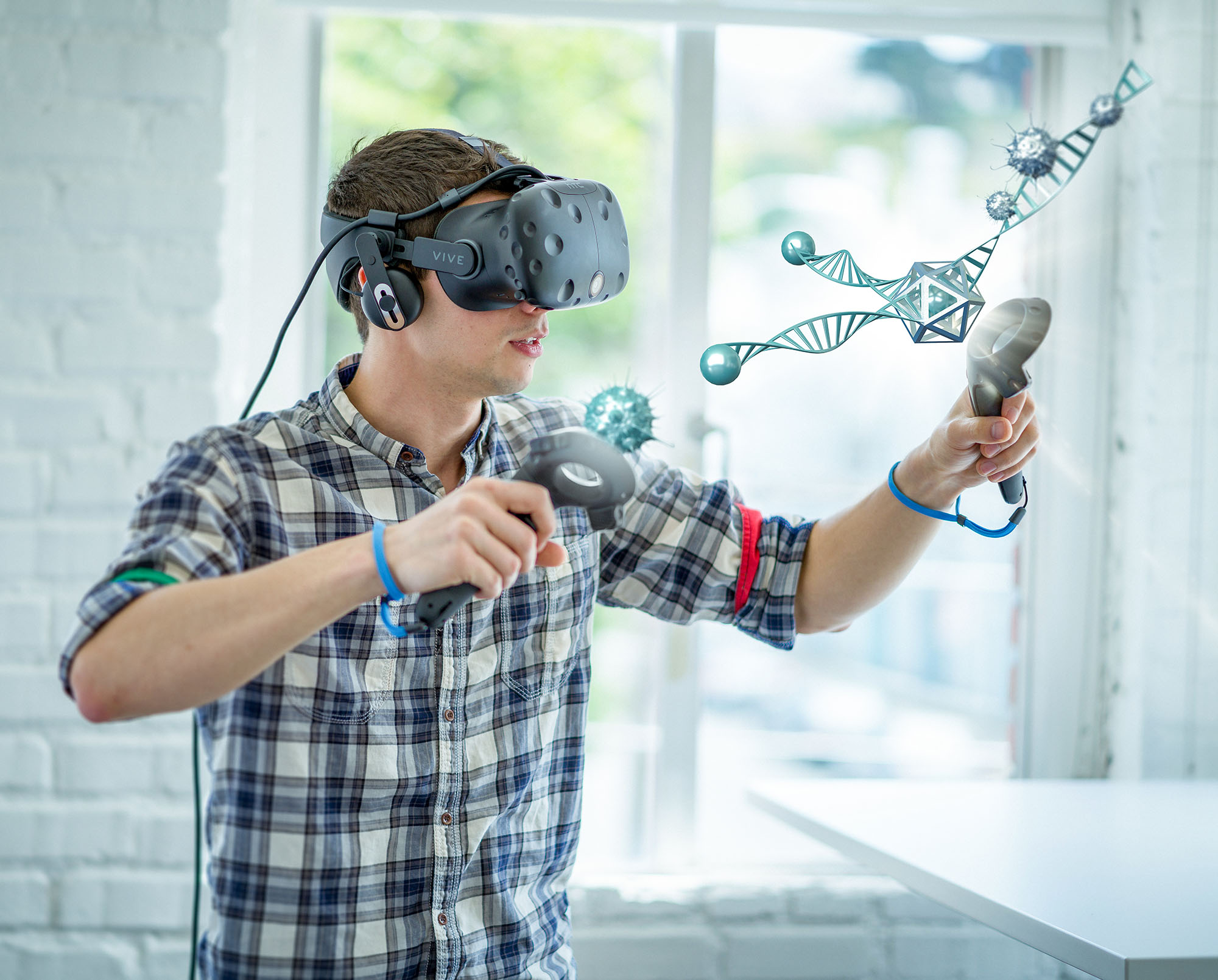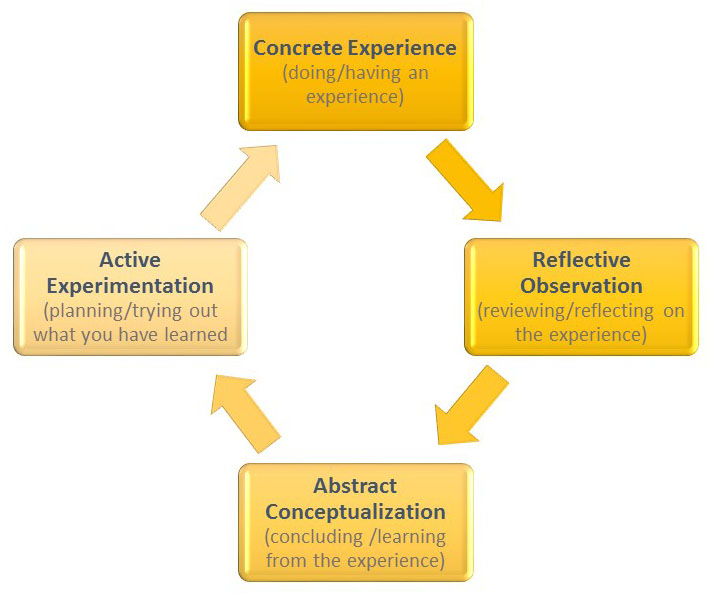June 2019
Online Experiential Learning: A Game Changer in Online Education
6/18/2019
Experiential learning has a broader meaning in online learning environments. The “real world” goes beyond a physical space/domain. Immersive technology (e.g., 3D multi-user virtual

This image illustrates Mixed Reality. Check out a great article in EDUCAUSEreview - Mixed Reality: A Revolutionary Breakthrough in Teaching and Learning.
environment, virtual reality, augmented reality) provides virtual real-life environments in which students can learn and practice both disciplinary and non-cognitive skills through case studies, role-playing, and virtual labs (Towards Maturity, 2013). Mixed Reality, the most recent development in immersive technology, enables students to experience a “blended” world where real and virtual objects coexist (Forbes, 2018).
Using Mixed Reality, students work individually and collaboratively on objects (e.g., holographic anatomy), complete learning tasks (e.g., performing a surgical procedure), and interact with world-class experts, and receive real-time feedback (Workman, 2018). In the same vein, computer simulation holds great potential to facilitate experiential learning and promote higher levels of learning.
In “Computer Simulation in Higher Education: Affordances, Opportunities, and Outcomes,” Qian (2017) developed a learning outcome-based categorization system of computer
simulation: modeling-based simulations (for memorization, comprehension), task/skill-based
simulations (for application), and problem-solving & decision-making simulations (for
analysis, evaluation, and synthesis). This cognitive level-based typology of computer
simulation provides a roadmap to guide educators in selecting or developing appropriate
computer simulation programs to facilitate experiential learning in an online learning
environment.
Experiential Learning
Experiential learning is a well-established pedagogical framework that provides students opportunities to experience, observe, conceptualize, reflect, and act in real world settings and contexts. It has been implemented widely in education and training as an effective strategy to engage and challenge learners to acquire and practice higher levels of learning (e.g., problem solving, creativity, teamwork), and apply what they learned in a real-world project.
Many higher education institutions use experiential learning or variations of it, such as service learning and community-based learning, at the undergraduate level. However, its implementation in online graduate education is still in its infancy.
The design of online experiential learning projects in a program is based on the key principle of experiential learning – learning by doing through four stages:
- Concrete Experience, in which learners actively “experience” a new situation or activity;
- Reflective Observation, when learners consciously reflect on the experience;
- Abstract Conceptualization, in which learners crystalize the observation and reflection into a higher level of thinking (i.e., new ideas, concepts), and
- Active Experimentation, in which learners apply and test the ideas/concepts in new situations (Kolb, 1984).
Applying Experiential Learning in an Online, Graduate-Level Course
Some people may wonder what “real life” or “real world” looks like in a virtual learning environment and how experiential learning cycles and strategies work in an online graduate program. Teaching and learning in online environments has long been criticized for the lack of real-time interactions and for the impossibility of learning by doing through hands-on opportunities.

An illustration of Kolb's experiential learning cycle (Kolb, 1984). This model also appears in SimplyPsychology's article: Kolb's Learning Styles and Experiential Learning Cycle.
The integration of experiential learning into online education will be a game changer to drastically change the notion of online learning – the learning environment can go beyond “virtual”; it can be real, extended, and connected; learning online is not only about video lectures and discussion boards, it is about “doing,” “problem-solving,” and “networking.”
LSU’s online Master of Arts in Education with a Specialization in Educational Technology is leading the way in implementing experiential learning in online education. Students in this program, mostly working professionals, are expected to complete a series of experiential learning projects that are highly relevant to their profession or career aspiration; these experiential learning projects accumulate into an e-portfolio that documents and showcases their learning outcomes and intellectual growth in the program.
In the Technology Leadership in Education course, students gain first-hand experience with technology leadership by interacting with and observing educational leaders and change agents in a real educational and/or training setting, collecting relevant empirical data (both quantitative and qualitative) for analysis against the national/theoretical frameworks or exemplars of technology leadership examined in the course, and finally, planning technology-enabled innovation for the educational institution/unit.
The melding of online classroom and the real world expands the learning opportunities and deepens learning for students in the program.
Different from traditional online learning, which largely consists of video lectures, online discussions, and online assessments, LSU’s online Master of Arts in Education with a Specialization in Educational Technology program provides students with an unprecedented online learning experience, characterized by integrating classroom learning with real-world work, as well as by using immersive and collaborative tools for experiential learning in the virtual world. The learning platform is extended, learning opportunities expanded, and the depth of knowledge and skills deepened.
To learn more about LSU’s online Master of Arts in Education with a Specialization in Educational Technology degree, please visit this link.
References
Forbes. (2018). The difference between virtual reality, augmented reality and mixed reality. Retrieved from https://www.forbes.com/sites/quora/2018/02/02/the-difference-between-virtual-reality-augmented-reality-and-mixed-reality/#5c00458c2d07
Kolb, D. A. (1984). Experiential learning: Experience as the source of learning and development. Englewood Cliffs, NJ: Prentice-Hall.
Qian, Y. (2017). Computer simulations in higher education: Affordances, opportunities, and outcomes. In P. Vu, S. Fredrickson, & C. Moore (Eds.), Handbook of research on innovative pedagogies and technologies for online learning in higher education (pp. 239-265). Hershey, PA: IGI Global.
Towards Maturity. (2013). Online experiential learning: Helping individuals practise and perform. Retrieved from https://towardsmaturity.org/wp-content/uploads/ woocommerce_uploads/2016/07/Helping-individuals-practice-and-Perform.pdf
Workman, S. (2018). Mixed reality: A revolutionary breakthrough in teaching and learning. Retrieved from https://er.educause.edu/articles/2018/7/mixed-reality-a-revolutionary-breakthrough-in-teaching-and-learning
Written by:
Jennifer Qian, EdD | Associate Professor of Professional Practice, MA in Education, Educational Technology Specialization Program
Dr. Jennifer Qian is the faculty lead and program advisor of MA in Education, Educational Technology Specialization Program. She also serves as the Associate Editor of the International Journal of Innovative Teaching and Learning in Higher Education. Her research areas include technology-enabled academic innovation, digital transformation, models of online education and best practices in online teaching for active and deep learning. Focusing on emerging technology and technology leadership, her recent publications include four edited books, "Integrating Multi-User Virtual Environments in Modern Classrooms" (2018), “Technology Leadership for Innovation in Higher Education” (2019), “Teaching, Learning, and Leading with Computer Simulations,” and “Advancing Educational Research through Emerging Technology (forthcoming).
